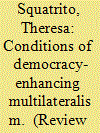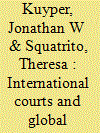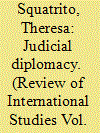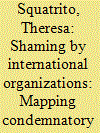|
|
|
Sort Order |
|
|
|
Items / Page
|
|
|
|
|
|
|
| Srl | Item |
| 1 |
ID:
117198


|
|
|
|
|
| Publication |
2012.
|
| Summary/Abstract |
As argued in a recent article by Keohane, Macedo, and Moravcsik, 'democracy-enhancing multilateralism' highlights the potential ways in which international organisations can enhance domestic democracy. The thesis raises an important question about the conditions which shape the likelihood that multilateralism will have such democratising effects. This article responds to the question of conditionality, looking at one way in which democracy may be improved by multilateralism-through the expansion of rights protections. That is, under what conditions will domestic democratic processes garner an improved ability to protect rights as a result of a state's participation in multilateral institutions? Using most likely empirical cases - the European Union (EU) and the Council of Europe (COE) - this article argues that three conditions affect the likelihood that rights expansion will result from multilateral legal institutions. Together the compatibility between the international legal principle and pre-existing domestic law, legal mobilisation, and the precision and obligation of the international law have significant affect on the likelihood of rights expansion. The unique contribution here is a set of conditions that helps to understand when and where rights are likely to expand as a result of a state's participation in international organisations.
|
|
|
|
|
|
|
|
|
|
|
|
|
|
|
|
| 2 |
ID:
134976


|
|
|
|
|
| Summary/Abstract |
Past decades have witnessed a shift in international cooperation toward growing involvement of transnational actors (TNAs), such as nongovernmental organizations, multinational corporations, and philanthropic foundations. This article offers a comprehensive theoretical and empirical account of TNA access to IOs. The analysis builds on a novel data set, covering formal TNA access to 298 organizational bodies from fifty IOs over the time period 1950 to 2010. We identify the most profound patterns in TNA access across time, issue areas, policy functions, and world regions, and statistically test competing explanations of the variation in TNA access. The central results are three-fold. First, the empirical data confirm the existence of a far-reaching institutional transformation of IOs over the past sixty years, pervading all issue areas, policy functions, and world regions. Second, variation in TNA access within and across IOs is mainly explained by a combination of three factors: functional demand for the resources of TNAs, domestic democratic standards in the membership of IOs, and state concerns with national sovereignty. Third, existing research suffers from a selection bias that has led it to overestimate the general importance of a new participatory norm in global governance for the openness of IOs.
|
|
|
|
|
|
|
|
|
|
|
|
|
|
|
|
| 3 |
ID:
151652


|
|
|
|
|
| Summary/Abstract |
In a post-Cold War era characterised by globalisation and deep interdependence, the actions of national governments increasingly have an effect beyond their own territorial borders. Moreover, key agents of global governance – international organisations and their bureaucracies, non-state actors and private agents – exercise pervasive forms of authority. Due to these shifts, it is widely noted that world politics suffers from a democratic deficit. This article contributes to work on global democracy by looking at the role of international courts. Building upon an original dataset covering the 24 international courts in existence since the end of the Second World War, we argue that international courts are able to advance democratic values and shape democratic practices beyond the state. They can do so by fostering equal participation, accountability, and public justification that link individuals directly with sites of transnational authority. We contend that the ability of international courts to promote these values is conditioned by institutional design choices concerning access rules, review powers, and provisions regarding judicial reason-giving. We canvass these design features of different international courts and assess the promises and pitfalls for global democratisation. We conclude by linking our analysis of international courts and global democratisation with debates about the legitimation and politicisation of global governance at large.
|
|
|
|
|
|
|
|
|
|
|
|
|
|
|
|
| 4 |
ID:
179320


|
|
|
|
|
| Summary/Abstract |
Observers of international courts (ICs) note that several ICs carry out a broad range of non-judicial activities, ranging from legal training workshops and public seminars to visits with public officials. Despite the growing prominence of these activities, they have received little attention from scholars. Seeking to fill this gap, this article examines these activities as a form of ‘judicial diplomacy’, asking how and why ICs employ judicial diplomacy. The article argues that ICs use judicial diplomacy as a means of legitimation. They seek to boost institutional legitimacy through their judicial diplomacy by targeting the public and communicating norm-referential narratives about their processes and outcomes. This argument bears out in case studies on the judicial diplomacy of the African Court of Human and Peoples’ Rights and the Caribbean Court of Justice. Both courts are shown to have judicial diplomacy that is public-oriented and people-centred. This argument has important implications for literature on international courts and the legitimacy of international institutions.
|
|
|
|
|
|
|
|
|
|
|
|
|
|
|
|
| 5 |
ID:
167400


|
|
|
|
|
| Summary/Abstract |
In the face of escalating conflicts or atrocities, international organizations (IOs), alongside non-governmental organizations (NGOs), often vocalize public condemnation. Researchers have examined NGO shaming, but no extant literature has comparatively explored if, how and why IOs shame. This article fills this gap. We conceptualize IO shaming as condemnatory speech acts and distinguish between the agent, targets and actions of shaming. We theorize how compliance and socialization are motives that lead IOs to shame. Empirically, we use new data on more than 3000 instances of IO shaming, covering 27 organizations between 1980 and 2015 to examine empirical patterns across the three dimensions of agents, targets and actions. We find that the majority of IOs do employ shaming but to varying degrees. Global, general-purpose IOs shame the most and regional, task-specific IOs the least. IOs mainly shame states, but there is a rise in the targeting of non-state and unnamed actors. While many condemned acts relate to human rights and security issues, IOs shame actions across the policy spectrum. These findings indicate that IO shaming is driven by compliance and socialization motives and that it is a wider phenomenon than previously recognized, suggesting possible avenues for further inquiry.
|
|
|
|
|
|
|
|
|
|
|
|
|
|
|
|
|
|
|
|
|